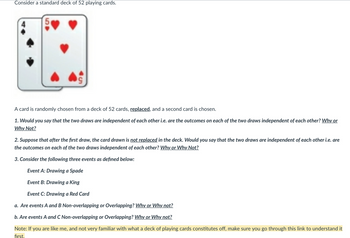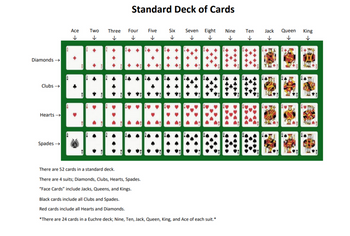
MATLAB: An Introduction with Applications
6th Edition
ISBN: 9781119256830
Author: Amos Gilat
Publisher: John Wiley & Sons Inc
expand_more
expand_more
format_list_bulleted
Question
please answer this. very confusing for me
- Two events are independent events if the occurrence of one
event does not affect the likelihood that the other event will occur. - Two events are dependent events if the occurrence of one event does affect the likelihood that the other event will occur.
- Two events are disjoint or mutually exclusive or non-overlapping if they cannot occur at the same time. For example, if we flip a coin it can only show a head OR a tail, not both.
- Two events are overlapping if they can occur at the same time. For example, when you roll a six-sided die, you could simultaneously get an even number (Event-1) and a prime number (Event-2) (i.e. when you roll the die and get a 2). Therefore, events of getting a prime number and an even number are overlapping and NOT mutually exclusive.

Transcribed Image Text:Consider a standard deck of 52 playing cards.
5
A card is randomly chosen from a deck of 52 cards, replaced, and a second card is chosen.
1. Would you say that the two draws are independent of each other i.e. are the outcomes on each of the two draws independent of each other? Why or
Why Not?
2. Suppose that after the first draw, the card drawn is not replaced in the deck. Would you say that the two draws are independent of each other i.e. are
the outcomes on each of the two draws independent of each other? Why or Why Not?
3. Consider the following three events as defined below:
Event A: Drawing a Spade
Event B: Drawing a King
Event C: Drawing a Red Card
a. Are events A and B Non-overlapping or Overlapping? Why or Why not?
b. Are events A and C Non-overlapping or Overlapping? Why or Why not?
Note: If you are like me, and not very familiar with what a deck of playing cards constitutes off, make sure you go through this link to understand it
first.

Transcribed Image Text:Diamonds →→
Clubs →
Hearts →→
Spades →
Ace
↓
Two
↓
Three
Standard Deck of Cards
Four
↓
Five
↓
·DAD:
QBA
Six Seven Eight
↓
↓ ↓
There are 52 cards in a standard deck.
There are 4 suits; Diamonds, Clubs, Hearts, Spades.
"Face Cards" include Jacks, Queens, and Kings.
Black cards include all Clubs and Spades.
Red cards include all Hearts and Diamonds.
*There are 24 cards in a Euchre deck; Nine, Ten, Jack, Queen, King, and Ace of each suit.*
Nine
↓
Ten
↓
Jack Queen
↓
↓
King
↓
Expert Solution
This question has been solved!
Explore an expertly crafted, step-by-step solution for a thorough understanding of key concepts.
This is a popular solution
Trending nowThis is a popular solution!
Step by stepSolved in 5 steps

Knowledge Booster
Similar questions
- pleaseeeee solve question 6, quickly pleasearrow_forwardThe probability of happening of an event A is 0.5 and that of B is 0.3. if A and B are mutually exclusive events then probability of neither A nor B isarrow_forwardWhen an event is an independent event, its occurrence does not affect nor is it affected by another event’s occurrence. True or Falsearrow_forward
- Sally and Mike are playing frisbee at the beach. When Sally throws the frisbee the probability is 0.13 that it comes back to Sally, the probability is 0.7 that it goes to Mike, and the probability is 0.17 that the dog runs away with the frisbee. When Mike throws the frisbee there is a 0.62 probability that Sally gets it, a 0.27 probability that it comes back to Mike, and a 0.11 probability that the dog runs away with the frisbee. Treat this as a 3--state Markov Chain with the dog being an absorbing state. (a) If Mike has the frisbee, what is the expected value for the number of times the frisbee will be thrown before the dog gets the frisbee and runs away with it? (Give your answer correct to 2 decimal places.) times thrown (b) If Mike has the frisbee, what is the expected value for the number of times Mike will throw the frisbee before the dog gets it? (Give your answer correct to 2 decimal places.) times Mike throwsarrow_forwardAn experiment consists of rolling a fair die twice. Let A be the event that in the second roll the die lands 1, 2, or 5; B be the event that in the second roll the die lands 4, 5, or 6; and C be the event that the sum of the two outcomes from the two rolls is 9. Please choose the correct answer:arrow_forwardNeed help with this Intro to probability and statistics homework problem. Mutually exclusive events and independent events are often confusing when first learned. In your own words, give a brief explanation of the difference between the two and an example of each. The brief explanation is 70 points and the example is 15 points.arrow_forward
- If events A and B are independent, then P(A U B) = 0. True or false?arrow_forwardWhat does it mean for two events to be mutually exclusive?arrow_forwardFrom an example in real life, give the probabilities of two events and the probability of both events occurring. Based on these events, phrase a question about a conditional probabilityarrow_forward
arrow_back_ios
arrow_forward_ios
Recommended textbooks for you
 MATLAB: An Introduction with ApplicationsStatisticsISBN:9781119256830Author:Amos GilatPublisher:John Wiley & Sons Inc
MATLAB: An Introduction with ApplicationsStatisticsISBN:9781119256830Author:Amos GilatPublisher:John Wiley & Sons Inc Probability and Statistics for Engineering and th...StatisticsISBN:9781305251809Author:Jay L. DevorePublisher:Cengage Learning
Probability and Statistics for Engineering and th...StatisticsISBN:9781305251809Author:Jay L. DevorePublisher:Cengage Learning Statistics for The Behavioral Sciences (MindTap C...StatisticsISBN:9781305504912Author:Frederick J Gravetter, Larry B. WallnauPublisher:Cengage Learning
Statistics for The Behavioral Sciences (MindTap C...StatisticsISBN:9781305504912Author:Frederick J Gravetter, Larry B. WallnauPublisher:Cengage Learning Elementary Statistics: Picturing the World (7th E...StatisticsISBN:9780134683416Author:Ron Larson, Betsy FarberPublisher:PEARSON
Elementary Statistics: Picturing the World (7th E...StatisticsISBN:9780134683416Author:Ron Larson, Betsy FarberPublisher:PEARSON The Basic Practice of StatisticsStatisticsISBN:9781319042578Author:David S. Moore, William I. Notz, Michael A. FlignerPublisher:W. H. Freeman
The Basic Practice of StatisticsStatisticsISBN:9781319042578Author:David S. Moore, William I. Notz, Michael A. FlignerPublisher:W. H. Freeman Introduction to the Practice of StatisticsStatisticsISBN:9781319013387Author:David S. Moore, George P. McCabe, Bruce A. CraigPublisher:W. H. Freeman
Introduction to the Practice of StatisticsStatisticsISBN:9781319013387Author:David S. Moore, George P. McCabe, Bruce A. CraigPublisher:W. H. Freeman

MATLAB: An Introduction with Applications
Statistics
ISBN:9781119256830
Author:Amos Gilat
Publisher:John Wiley & Sons Inc

Probability and Statistics for Engineering and th...
Statistics
ISBN:9781305251809
Author:Jay L. Devore
Publisher:Cengage Learning

Statistics for The Behavioral Sciences (MindTap C...
Statistics
ISBN:9781305504912
Author:Frederick J Gravetter, Larry B. Wallnau
Publisher:Cengage Learning

Elementary Statistics: Picturing the World (7th E...
Statistics
ISBN:9780134683416
Author:Ron Larson, Betsy Farber
Publisher:PEARSON

The Basic Practice of Statistics
Statistics
ISBN:9781319042578
Author:David S. Moore, William I. Notz, Michael A. Fligner
Publisher:W. H. Freeman

Introduction to the Practice of Statistics
Statistics
ISBN:9781319013387
Author:David S. Moore, George P. McCabe, Bruce A. Craig
Publisher:W. H. Freeman